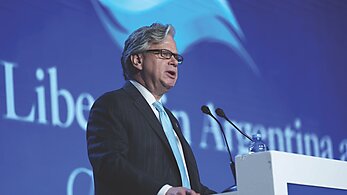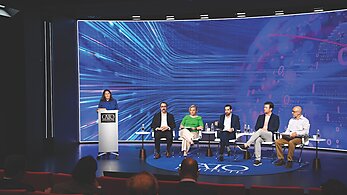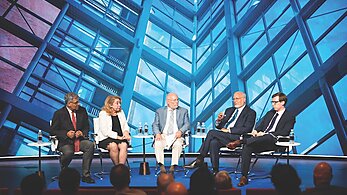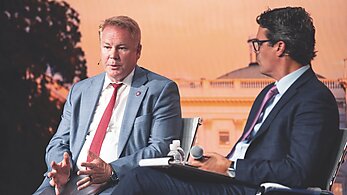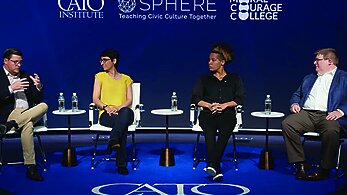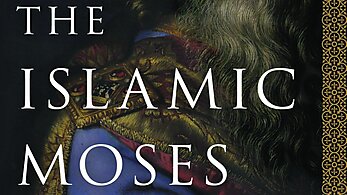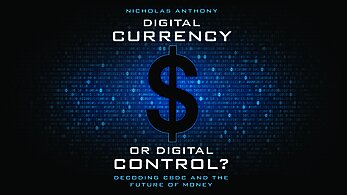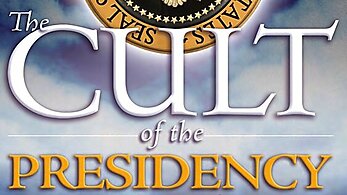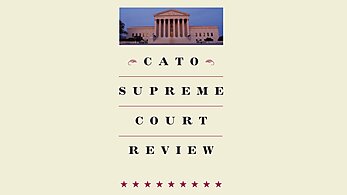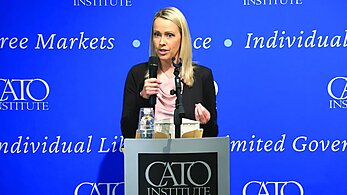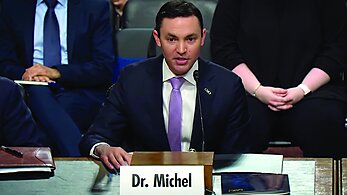A look at events, publications, and studies from the Cato Institute
Cato Quarterly
Events
The Rebirth of Liberty in Argentina and Beyond
Argentine president Javier Milei headlined a conference in Buenos Aires cohosted by Cato and the think tank Libertad y Progreso. Nearly 1,000 policymakers, journalists, business leaders, and students—as well as over 2.5 million online viewers—attended this global showcase of classical liberal ideas. Peter Goettler (above), president and CEO of the Cato Institute, encouraged Argentina’s leadership to “persist in its efforts to roll back the state.” Johan Norberg, Cato senior fellow, discussed the future of humanity in a virtual conversation with Elon Musk. Many other policymakers and scholars from around the world were invited by Ian Vásquez, vice president for international studies and director of the Center for Global Liberty and Prosperity at Cato.
The Future of Financial Freedom
Some policymakers have misrepresented decentralized finance (DeFi) as a tool for illicit activities such as money laundering and terrorism funding, leading to policy proposals that infringe on Americans’ financial freedom and threaten technological progress. Jennifer J. Schulp (far left), director of financial regulation studies in the Center for Monetary and Financial Alternatives (CMFA) at Cato, and Jack Solowey (third from right), policy analyst in the CMFA, invited leading experts to correct the record.
Institutional Suppression of COVID-19 Debate
Cato’s Jeffrey A. Singer (middle), senior fellow, and Ryan Bourne (far right), R. Evan Scharf Chair for the Public Understanding of Economics, hosted a screening of COVID Collateral: Where Do We Go for Truth? by filmmaker Vanessa Dylyn (middle left). Afterward, they explained the necessity of free scientific discourse with Dr. Jay Bhattacharya (far left), a top critic of public health agencies, and Robert R. Redfield (middle right), former director of the Centers for Disease Control and Prevention.
Rebalancing the NATO Alliance
The United States still carries a disproportionate share of the European continent’s defense burden. Cato and The American Conservative cohosted a half-day conference on the first day of NATO’s Washington summit to discuss how the United States can promote rebalancing the alliance. Rep. Warren Davidson (R‑OH) (left) concluded the event with Justin Logan (right), Cato’s director of defense and foreign policy studies, and said that America’s open checkbook has prevented European self-sufficiency and that our “foreign policy should be based on realism.”
Reducing Pharmaceutical Prices in Medicare
A complex array of government policies and market forces causes drug prices to be high in the United States. What are better ways to determine the “right” price for a drug? Michael F. Cannon (left), director of health policy studies at Cato, engaged Pragya Kakani (middle), assistant professor of population health sciences at Weill Cornell Medical College, and Luca Maini (right), assistant professor of health care policy at Harvard Medical School.
Reviving Civil Debate
Cato’s Sphere project cohosted a film screening of Mississippi Turning, the story of how the state replaced its flag after years of debate, protest, and fervid disagreement. Allan Carey (left), director of Sphere, and Irshad Manji (middle left), founder of Moral Courage College, led conversations with Genesis Be (middle right), founder of People Not Things, and Russ Latino (right), founder of the Magnolia Tribune.
Publications
The Islamic Moses
Mustafa Akyol, senior fellow in Cato’s Center for Global Liberty and Prosperity, takes readers on a theological and historical journey through that much neglected side of the Abrahamic triangle: the Judeo-Islamic tradition. At a time of bitter conflict in the Middle East, The Islamic Moses dives into the older, deeper, and unexpectedly brighter story of Jews and Muslims.
“Cogent, admirably concise, and thoroughly engaging.”
—Jack Miles, Pulitzer Prize–winning author of God in the Qur’an
Digital Currency or Digital Control
Central bank digital currencies (CBDCs) are not simply another form of money. CBDCs pose significant risks to financial privacy, freedom, and markets. Nicholas Anthony, policy analyst at the Center for Monetary and Financial Alternatives at Cato, provides everything you need to get up to speed on CBDCs so that you can know what is at stake.
“Nick Anthony has written a critical primer to the unfolding evolution of currency, as it continues its evolution from a paper or metal bearer instrument with privacy and freedom protections to an electronic mechanism of surveillance and control. For hundreds of millions of people, CBDCs are not some future threat, but a current danger.… This book is a valuable resource to help us understand why we must fight back.”
—Alex Gladstein, chief strategy officer, Human Rights Foundation
The Cult of the Presidency
Some books become more important over time, and that’s true of 2008’s The Cult of the Presidency by Gene Healy, senior vice president for policy, which contains a new preface. Healy took a step back from the ongoing red-team/blue-team combat and showed that the two sides agree on the boundless nature of presidential responsibility. The past 16 years confirmed his observations.
“Its emphasis on the limitations of the president [is] as relevant to those who seek to make the state work better as to those who seek to imprison it. Moreover, Healy is a graceful, funny, and fluid writer.”
—Ezra Klein, New York Times columnist
Cato Supreme Court Review
For 23 years now, the Cato Supreme Court Review has annually been the first journal in the nation to cover the decisions of the most recently completed Supreme Court term. Our authors come from across the ideological spectrum, but we invite those who are committed to liberty and limited government in at least the area they are writing about. Thomas A. Berry, editor in chief of the 2023–2024 Review, received a letter of thanks from Justice Elena Kagan for last year’s edition.
This year’s Review is no less broad, featuring chapters by the Hon. Bridget Mary McCormack (“Access to Justice and Public Confidence in the Law”); Clark Neily, senior vice president for legal studies, on FBI v. Fikre and “mootness”; Ilya Somin, B. Kenneth Simon Chair in Constitutional Studies at Cato, on Trump v. Anderson (presidential disqualification); Jack Beermann, Philip S. Beck Professor of Law at Boston University, on Loper Bright Enterprises v. Raimondo (Chevron deference); and many more.
Recent Cato Studies
New Poll: 74 Percent Worry Americans Could Lose Our Freedom If We’re Not Careful
Emily Ekins, vice president and director of polling at Cato, surveyed 2,000 Americans in collaboration with YouGov about America’s Founding, the Constitution, the rights they feel strongest about, their optimism for the future, and their knowledge of early US history. Eighty-five percent said they have a favorable view of the US Constitution, but 34 percent of those under age 35 said they have either an unfavorable view or simply don’t care about it. Republicans were more likely than Democrats to report caring about rights to self-defense, religion, speech, and protection from unlawful searches and seizures. At the same time, Democrats were more likely to say that having the right to a trial by jury was extremely important.
Slashing Tax Rates and Cutting Loopholes
Congress has an unprecedented opportunity to cut tax rates to their lowest level in almost a century. Adam N. Michel’s June policy analysis outlines options for tax reform in the 119th Congress. His detailed recommendations emphasize a simplified, pro-growth tax system that eliminates loopholes. Expanding the most successful features of the 2017 Tax Cuts and Jobs Act is an excellent start. Michel’s policy analysis clearly projects expected revenue changes from each recommendation for policymakers to consider.

This work is licensed under a Creative Commons Attribution-NonCommercial-ShareAlike 4.0 International License.
